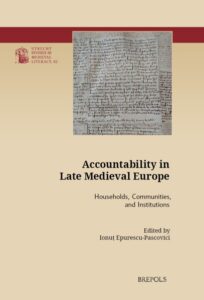
Accountability in Late Medieval Europe: Hoiuseholds, Communities, and Institutions, ed. Ionuț Epurescu-Pascovici (Turnhout, 2025: Utrecht Studies in Medieval Literacy 62), ISBN 978-2-503-61670-4.
This volume brings together studies of late medieval accountability in both the domestic and the public realms. It traces practices of accountability across the social spectrum, from households to small businesses to communal and regnal administrations, highlighting the intersections between competing conceptions of personal and institutional responsibility. Focusing on France and Italy from the thirteenth to the early sixteenth centuries, the case studies follow territorial officers, consular agents, and town notables co-opted into local governance from Avignon and Marseille to Tuscany and the Venetian and Genoese overseas territories. The studies explore both personal and institutional accounting registers, as well as records of a textual nature, such as rulebooks and inquests, in an effort to reflect the range of records and procedures relied on to achieve a measure of accountability in late medieval Europe.
Ionuț Epurescu-Pascovici, “Current Perspectives on Personal and Institutional Accountability in Late Medieval Europe”
Marie Dejoux, “Accountability or Culpability? Territorial Officers Facing the French Monarchy, Thirteenth and Fourteenth Centuries”
Armand Jamme, “Private Accounting in Curial Avignon: The Ledgers of Pierre Boyer, Papal Servant under Urban V, Gregory XI, and Clement VII”
Serena Galasso, “A Book of One’s Own: Private Records and Accountability through a Gendered Perspective in Late Medieval Florence”
Alessandro Silvestri, “Accounting and Corruption in the Fifteenth-Century Kingdom of Sicily”
François Otchakovsky-Laurens, “The Municipal Accountability of Fourteenth-Century Marseille”
Dania-Silvia Caciur-Andreescu, “The Venetian Counts of Late Medieval Dalmatia: Institutional Responsibilities and Accountability Mechanisms”
Alessandro Flavio Dumitraşcu, “The Venetian and Genoese Black Sea Agents: Accountability and Institutional Dialogue with the Metropolis (Fourteenth and Fifteenth Centuries)”
Emanuele Carletti, “Reddere Rationem: Financial Management in the Mendicant Orders (Thirteenth and Fourteenth Centuries)”
Marco Conti, “Indirect Taxation, Liability, and ‘Semi-Public’ Records: The Accounting Practices of the Gabellers of the Commune of Bologna (Thirteenth and Fourteenth Centuries)”
Anna Pomierny-Wąsińska, “Urban Measurements and Accountability in Late Medieval Florence”
Paola Pinelli, “Artisans and Small Merchants as Accountants of Tuscan Institutions (Fourteenth to Sixteenth Centuries)”
Contributors

